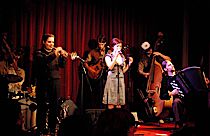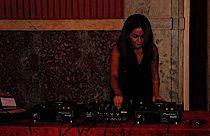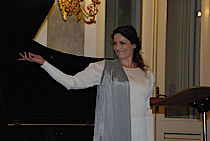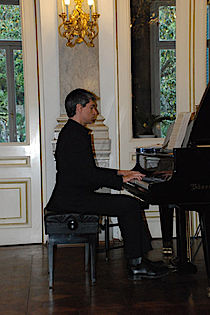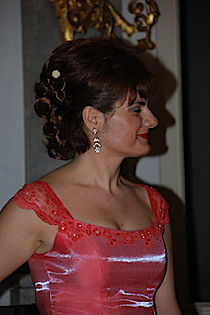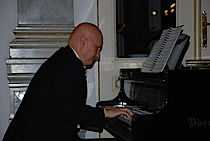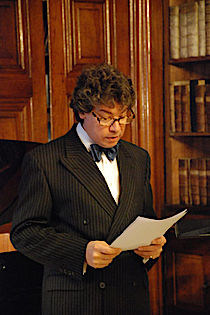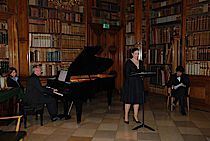Fatima Spar and The Freedom Fries
Sunday, November 15, 2009, 24h00
Volkstheater Wien, Rote Bar
Fatima Spar (vocals)
Alexander Wladigeroff, Martin Eberle (trumpet, flugelhorn)
Andrej Prosorov (soprano sax)
Phil Yeager, Clemens Hofer (trombone)
Milos Todorovski (accordion)
Florian Kmet, Florian Wagner (guitar)
Philipp Moosbrugger (upright bass)
Erwin Schober (drums)
Fatima Spar and The Freedom Fries play a great concert with songs from their albums
Zirzop and Trust
afterwards...
DJ Miss Ümit
Monday, November 15, 2009, 02h00
Volkstheater Wien, Rote Bar
Club Night with DJ Miss Ümit
Lounge / Bossa Nova / Nu Jazz
Arthur Schoonderwoerd spielt auf einem Hammerflügel von André Stein
Monday, October 19, 2009
Musikverein Wien, Steinerner Saal
Arthur Schoonderwoerd
spielt auf einem Hammerflügel von André Stein, Wien 1820 aus den Sammlungen der Gesellschaft der Musikfreunde
Werke von
Joseph Haydn (1732-1809)
Sonate in C-Dur, Hob. XVI:50
Allegro
Adagio
Allegro molto
Johann Worzischek (1791-1825)
Rhapsodie in d-Moll (1818)
Anton Reicha (1770-1835)
Zwei Fugen (a-moll und C-Dur), aus: 36 Fugen für Klavier (1805)
Ludwig van Beethoven (1770-1827)
Sonate in As-Dur, op. 26
Andante con Variazioni
Scherzo. Allegro molto
Marcia funebre sulla morte d'un Eroe
Allegro
[mehr...]
SULTANS AT THE OPERA
Saturday, April 25, 2009 19h30
Vienna, Bibliotheca Theresiana
PROGRAMME
Giuseppe Donizetti (1788-1856)
Marcia Imperiale (Marcia di Mahmoud)
Vincenzo Bellini (1801-1835)
"Ah' Se non m'ami piu" Scene and Aria of Isoletta - La Straniera
Gaetano Donizetti (1797-1848)
"Corri, amica, corri" Aria and Cavatina of Irene - Belisario
Giuseppe Donizetti (1788-1856)
S,ark-i Cedîd der vasf- Hazret-i Vâlide-i Sultan Abdülmecid Han
[New Song for Her Highness the Mother of Sultan Abdülmecid Khan]
Sultan Abdülaziz (1830-1876)
Invitation à la Valse
Angelo Mariani (1821-1873)
"Amami" Romanza - Rimembranze del Bosforo
Gaetano Donizetti
"Oh mio Fernando" Recitativo and Aria of Leonora - La Favorita
Gaetano Donizetti
Gran Marcia Militare Imperiale di Abdul-Medjid Khan
Anna Pangalou (Mezzo-Soprano)
Dieter Paier (Piano)
Emre Araci (Concept and Presentation)
Sultans at the Opera
Devised and presented by music historian Emre Araci, with operatic arias selected and performed by mezzo-soprano Anna Pangalou and accompanied by pianist Dieter Paier, Sultans at the Opera takes us to the banks of the Bosphorus in the nineteenth century. There, Italian opera became 'the rage among Mussulmans,' as reported in The Times, and a brilliant opera house opened where Gustave Flaubert saw Lucia di Lammermoor and the librettist Felice Romani heard excerpts from La Straniera. This was a time when Giuseppe Donizetti, the eldest brother of Gaetano Donizetti, served the Ottoman sultans, Mahmud II and his successor Abdülmecid, as their master of music, penned Turkish songs and eventually rose to the rank of a 'pasha.' The sultans regularly proceeded to the mosque in state and sometimes to their seats in the imperial box at the opera house to the strains of Rossini marches and operatic interludes. Ladies of the harem learned to play the pianoforte with instruments imported from Vienna, while the passion of the court for the ballroom music of Europe resulted in royal compositions by members of the imperial Ottoman family, including ruling sultans, in the genres of polkas, marches and waltzes, to the extent that some even appeared in the catalogues of European publishing houses. Angelo Mariani directed two operatic seasons at the city's Naum Theatre and commemorated his time there in a set of love songs, Rimembranze del Bosforo, now long forgotten, including Amami set to the text of the celebrated Giacomo Casanova, while Richard Wagner, whose music he championed in Italy, enjoyed the patronage of Sultan Abdülaziz among the benefactors of the Bayreuth Festival Theatre. Apart from supporting Wagner, the Ottoman sultan also published several short dance pieces for the pianoforte in Italy, which included Invitation à la Valse. Tonight's concert evokes this lost age through music and historic commentary and illuminates an unexpected and brief façade in Ottoman musical history.
LYRICS
Vincenzo Bellini
"Ah! Se non m'ami piu" Scene and Aria of Isoletta - La Straniera
Nè alcun ritorna?... Oh! cruda, dolorosa incertezza!
Ognun mi lascia! quel che avvenne ignorar
Tutto è mistero, incertezza, e squallor quanto qui vedo.
Artur m'abbandonò... che più richiedo?
E di mie nozze il giorno era pur questo!
E sul mio petto ancora stassi il pegno d'amor,
che di sua mano v'appese l'infedel!
Eccolo... ei sembra di un suo tenero sguardo ancor bearmi...
sembra, ah! sembra che ancor giuri d'amarmi.,
Ah! se non m'ami più, perchè si dolce ancor?
sembra parlar d'amor il tuo sorriso?
Ah! se non m'ami più, mi rendi il core almen,
Il core che dal sen tu m'hai diviso,
A chi parlo? a chi favello? lunge e Artur...
(CORO Esulta; ei riede.
ISOLETTA Che mai dite?...
CORO È nel castello.
ISOLETTA A che vien?
CORO Perdono ei chiede; Te fin d'oggi all'ara ei brama, E il consente il genitor.
ISOLETTA E fia ver?
CORO Ei t'ama, ei t'ama, è pentito dell'error.)
ISOLETTA
Io sua sposa!... Oh! lieto giorno!
M' ama ancora!... Oh! sommo bene!
Se il dolor tal premio ottiene, fortunato il mio dolor.
Al mio sguardo un roseo velo
Veste il cielo - il suol s'infiora;
Ogni oggetto amor colora
Della gioja del mio cor.
Gaetano Donizetti
"Corri, amica, corri" Aria and Cavatina of Irene - Belisario
IRENE
Corri amica... voliam sulla sponda all'amplesso del forte che arriva...
Ve', pe', trivi già il popolo inonda.
Odi il suon della calca festiva...
Delle trombe frammisto allo squillo del trionfo già l'inno intuonò;
Salutando l'augusto vessillo che il terror fra i nemici portò.
La man terribile del vincitor di baci fervidi io coprirò,
e al sen stringendomi del genitor, rapita in estasi d'amor sarò.
Un pianto tenero forse gli accenti sul labbro tremulo mi troncherà...
Ma quelle lagrime fieno eloquenti, ma quel silenzio tutto dirà!
Giuseppe Donizetti
S,ark-i Cedîd der vasf- Hazret-i Vâlide-i Sultan Abdülmecid Han
[New Song for Her Highness the Mother of Sultan Abdülmecid Khan]
I | I |
Cihân eltâfina memnûn
Serâpa feyzine makrûn
Nihâdin cûduyla meshûn
Ola ömrün sehâ efzûn | The world is happy for your kindness
With boundless wisdom
Your nature is full of generosity
Long may you live |
II | II |
Edince fasl-i sâza âgâz
Olur hânendeler demsâz
Edip hos gûs-i söz u sâz
Ola ömrün sehâ efzûn
[...] | When they start performing
The singers become friends
Playing and hearing pleasant music
Long may you live
[...] |
V | V |
Desin Faik kulun sarki
Bulasin nüzhet ü sevki
Edip devletle her zevki
Ola ömrün sehâ efzûn | Let your servant Faik say 'Song'
May you find peace and pleasure
Fulfilled with stately joy
Long may you live |
Angelo Mariani (1821-1873)
"Amami" Romanza - Rimembranze del Bosforo
O giovinetta vergine dal molle crin dorato
Vederti e a te rivolgersi non é fralezza, é fato:
l'alma tua pura eterea ogni mortale adora:
il cielo s'innamora di tua beltà, di te.
Chè non poss'io dei magici raggi del sol gemmarti,
cingerti il crin di mistici serti dell' alba e darti
tutti i color dell' iride, di tutti fior gl' incensi,
ed educar tuoi sensi alla pietà di me?
Amami, o santa, ed anima dolce rispondi ad alma;
sull' ara a mezzo il tempio palma si aggiunga si aggiunga a palma.
Amami : un solo volgimi, un guardo innamorato,
ch? io viva invidiato dagli angeli con te.
Gaetano Donizetti
"Oh mio Fernando" Recitativo and Aria of Leonora - La Favorita
Fia dunque vero... oh Ciel!
desso, Fernando, lo sposo di Leonora! Ah!
Tutto mel dice, e dubbia l'alma ancora
all'inattesa gioia!
Oh Dio! Sposarlo...
oh mia vergogna estrema!
In dote al prode recar il disonor!
No... mai dovesse esecrarmi... fuggir!
saprà in brev'ora chi sia
la donna che cotanto adora!
O mio Fernando, della terra il trono.
A possederti avria donato il cor;
Ma puro l'amor mio, come il perdono,
Dannato - ahì, lassa! e a disperato orror!.
Il ver fia noto, e in tuo dispregio estremo
la pena avrommi che maggior si de'.
Ah! - Se il guisto tuo sdegno allor, allor fia scemo,
piombi, gran Dio, la folgor tua su me!
Ah, se fia sceno il tuo disdegno,
piombi, O Dio, la fulgor tua su me!
Su, crudely? - e chi v'arresta?
Scritto in cielo e il mio dolor!
Su, venite, ell'una festa,
sparsa l'ara sia di fior,
Già la tomba a me s'appresta,
E coperta in negro vel
sia la trista fidanzata
che rejetta, disperata.
non avrà perdono in ciel...
Maledetta, disperata.
non avrà perdono in ciel,
Ah, la trista fidanzata
Non avrà perdono in ciel!
Maledetta, disperata,
Non avrà perdono in ciel!
Haydn in niederweiden
Friday, July 10, 2009, 19h30
Schloss Niederweiden
P R O G R A M M E
Joseph Haydn
Four Songs from The English Canzonettas (Hob. XXVIa, no. 30, 31, 32, 35); poetry by Anne Hunter
Maurice Ravel
Menuet sur le nom d'Haydn
Joseph Haydn
"Valorosi compagni... Dove son! Che miro intorno." Recitativo ed aria di Ubaldo da Armida, dramma eroico di Nunziato Porta (Hob. XXVIII:12)
Claude Debussy
"Hommage à Joseph Haydn" for piano, L. 115
Joseph Haydn
"Arianna a Naxos" cantata a voce sola (Hob. XXVIb:2)
Anna Pangalou (Mezzo-Soprano)
Nikolas Tsalikis (Piano)
LYRICS
Joseph Haydn (1732-1809)
Four Songs from The English Canzonettas (1794/1795) (Hob. XXVIa : 31, 32, 35, 30); poetry by Anne Hunter
Sailor's Song
High on the giddy bending mast
The seaman furls the rending sail ,
And , fearless of the rushing blast ,
He careless whistles to the gale .
Rattling ropes and rolling seas ,
Hurly-burly , hurly-burly ,
War nor death can him displease .
The hostile foe his vessel seeks ,
High bounding o'er the raging main ,
The roaring cannon loudly speaks ,
Tis Britain's glory we maintain .
Rattling ropes and rolling seas ,
Hurly-burly , hurly-burly ,
War nor death can him displease . | The Wanderer
To wander alone when the moon ,
faintly beaming
With glimmering lustre ,
darts throw the dark shade ,
Where owls seek for covert ,
and nightbirds complaining
Add sound to the horror that darkens the glade .
Tis not for the happy ;
come , daughter of sorrow ,
Tis here thy sad thoughts
are embalm'd in thy tears ,
Where , lost in the past ,
disregarding tomorrow ,
There's nothing for hopes and nothing for fears . |
Piercing Eyes Why asks my fair one if I love ?
Those eyes so piercing bright
Can ev'ry doubt of that remove ,
And need no other light .
Those eyes full well do known my heart ,
And all its working see ,
E'er since they play'd the conq'ror's part ,
And I no more was free .
|
Fidelity While hollow burst the rushing winds ,
And heavy beats the show'r ,
This anxious , aching bosom finds
No comfort in its pow'r .
For ah , my love , it little knows
What thy hard fate may be ,
What bitter storm of fortune blows ,
What tempests trouble thee .
A wayward fate hath spun the thread
On which our days depend ,
And darkling in the checker'd shade ,
She draws it to an end .
But whatsoe?er may be our doom ,
The lot is cast for me ,
For in the world or in the tomb ,
My heart is fix'd on thee .
|
In May 1909 Jules Écorcheville, the founder/editor of the periodicals Revue musicale de la Société Musicale Indépendante and Revue musicale mensuelle de la Société Internationale de Musique, invited a number of French composers to write a short piano piece as homage to Joseph Haydn, commemorating the centenary of his death. The musical material was adapted from a series of notes based on the letters of Haydn's name (H-A-D-D-G, in French nomenclature, and following the famous example B A C H given by Johann Sebastian Bach on his own name), chosen after the following scheme:
A B C D E F G H I J K L M N O P Q R S T U V W X Y Z
A B C D E F G H B C D E F G A B C D E F G A B C D E
Amongst the invited composers, Camille Saint-Saens (1835-1921), though approving the desire of honouring Haydn, remained sceptical on the concept, as he wrote to his pupil Gabriel Fauré (1845-1924) on July 16, 1909: "I am writing to M. Écorcheville, asking him to prove to me that the two letters Y and N can signify d and g. I ask you to do the same. It would be annoying to get mixed up in a silly business which would make us the laughing stock of the German musical world."
Participants untainted with such retentions were Charles-Marie Widor (1844-1937), Vincent d'Indy (1851-1931) Claude Debussy (1862-1918), Paul Dukas (1865-1935), Maurice Ravel (1875-1937), and Reynaldo Hahn (1875-1947). The compositions were first published in a special issue January 1910 and first represented by Ennemond Trillat in a concert of the Société Nationale de Musique at the Salle Pleyel in Paris on March 11, 1911.
Maurice Ravel (1875-1937)
Menuet sur le nom d'Haydn
Pour piano, en G majeur
Joseph Haydn
"Valorosi compagni... Dove son! Che miro intorno" (1783). Recitativo ed aria di Ubaldo da Armida, dramma eroico di Nunziato Porta (Hob. XXVIII : 12)
Valorosi Compagni, nuovi perigli
A superar vi guido . Andiam !
Ma qual d'intorno odo rumor d?impetuosi venti .
Di qual' orror veggio coprirsi il ciglio , e in seno
Mi scorre un freddo gelo .
Come ! Pavento ? Oimè !
Compie sicuro d' avanzarmi or qui provo
Ma Ubaldo or più in Ubaldo io non ritrovo .
Dove son ? Che miro intorno !
Son di Lete sulle sponde
O son questi i rai del giorno ?
Il pensier mi si confonde ,
Sento l'alma ad agitar . | Tapf're Gefährten , neue Gefahr
Führ ich Euch überwinden . Auf !
Doch hör ich rings den Lärm von Sturmestoben .
Vor welchem Schrecken dunkelt mir der Blick ,
Friert mir die Brust zu Eis ?
Wie ! Furchtsam ich ? Weh mir !
Sicher voran soll schreiten ich nur immer
Und find mich selbst doch in mir selber nimmer .
Wo bin ich ? Um mich , was schau? ich!
Sind die Ufer dies des Lethe
Oder noch des Tages Strahlen ?
Mein Gedanke sich verwirret ,
Meine Seel' erregt in Qualen .
|
Claude Debussy (1862-1918)
"Hommage à Joseph Haydn" Pour piano, en G majeur. Mouvement de Valse lente
( L. 115 )
Joseph Haydn
"Arianna a Naxos" (1789) cantata a voce sola con accompagnamento del clavicembalo o forte-piano (Hob. XXVIb:2). Poesia probabilmente di Nunziato Porta
Adagio
Teseo mio ben , dove sei tu ?
Vicin d' averti mi parea ,
Ma un lusinghiero sogno
Fallace m' ingannò .
Già sorge in ciel la rosea Aurora ,
E l' erbe e i fior colora Febo
Uscendo dal mar col crine aurato . Sposo , sposo adorato , dove guidasti il piè ?
Forse le fere ad inseguir
Ti chiama il tuo nobile ardor .
Ah vieni , ah vieni , o caro ,
Più grata offrirò preda ai tuoi lacci .
Il cor d' Arianna amante ,
Che t' adora costante ,
Stringi con nodo più tenace ,
E più bella la face
Splenda del nostro amor .
Soffrir non posso
D' esser da te divisa un sol istante .
Ah di vederti , o caro ,
Già mi strugge il desio ;
Ti sospira il mio cor ,
Vieni , idol mio . | | Adagio
Theseus , mein Leben , wo nur bist du ?
Dich süß an meiner Seite ruhend glaubt' ich -
Doch nur ein schmeichelnd Traumbild
Hat mich getäuscht , betrogen .
Schon steigt die Morgenröte auf den Himmel ,
Und Gras und Blüten färbt der Sonnengott ,
Der aus dem Meere taucht mit goldnen Locken - Gatte , geliebter Gatte , wo setzt den Fuß du hin ?
Vielleicht zur Jagd auf wilde Tiere
Ruft dich dein edler Trieb .
Ach komm , ach komm , Geliebter ,
Beglückt sei ich die Beute deiner Schlingen .
Das Herz der treuen Gattin ,
Das standhaft für dich schlägt ,
Bind' es mit fester'm Band ,
Und heller wird die Fackel
Unserer Liebe lodern .
Nicht länger kann ich tragen
Von dir getrennt zu sein nur einen Augenblick .
Ach , Liebster , dich zu sehen
Quält mich all mein Verlangen .
Mein Herz erseufzet dich ,
Komm , du mein Leben . |
Aria (Largo) Dove sei , mio bel tesoro ,
Chi t' invola a questo cor ?
Se non vieni , io già mi moro ,
Né resisto al mio dolor .
Se pietade avete , oh Dei ,
Secondate i voti miei ,
A me torni il caro ben .
Dove sei ? Teseo !
| |
Arie Wo bist du , mein schöner Engel ,
Wer bringt dich an dieses Herz ?
Kommst du nicht , find ich mein Ende :
Widerstehe nicht dem Schmerz !
Wenn ihr Mitleid fühlt , ihr Götter ,
Gnadenvoll blickt auf mich nieder :
Der Geliebte kehre wieder .
Wo verweilst du? Theseus !
|
Recitativo
Ma , a chi parlo? Gli accenti
Eco ripete sol .
Teseo non m' ode , Teseo non mi risponde ,
E portano le voci e l' aure e l' onde .
Poco da me lontano esser egli dovria .
Salgasi quello che più d' ogni altro
S' alza alpestre scoglio ;
Ivi lo scoprirò .
Che miro ? Oh stelle , misera me ,
Quest' è l' argivo legno !
Greci son quelli !
Teseo ! Ei sulla prora !
Ah , m' ingannassi almen ...
No , no , non m' inganno .
Ei fugge , ei qui mi lascia in abbandono .
Più speranza non v' è , tradita io sono .
Teseo , Teseo , m'ascolta , Teseo !
Ma oimè ! Vaneggio ! I flutti e il vento
Lo involano per sempre agli occhi miei . Ah siete ingiusti , o Dei ,
Se l' empio non punite ! Ingrato !
Perchè ti trassi dalla morte ,
Dunque tu dovevi tradirmi !
E le promesse , e i giuramenti tuoi ?
Spergiuro , infido ! hai core di lasciarmi .
A chi mi volgo ,
Da chi pietà sperar ? Già più non reggo ,
Il piè vacilla , e in così amaro istante
Sento mancarmi in sen l' alma tremante .
| |
Rezitativ
Doch zu wem red' ich ? Meine Klagen
Gibt Echo nur zurück .
Theseus - er hört nicht , gibt keine Antwort ,
Nur Wind und Wellen gilt mein Rufen .
Doch kann er weit nicht sein von mir .
Erklommen jene Felsenklippe sei ,
Die sich am höchsten unter allen hebt ;
Von dort entdeck ich ihn .
Was seh' ich ? Nein , entsetzlich ,
Das ist das Schiff der Griechen ?
Griechen sind jene !
Theseus ! Er auf dem Bug !
Wenn ich mich täuschte ?
Nein, nein , ich täusch mich nicht .
Er flieht , er läßt mich hier verschmachten .
Ich bin verraten , keine Hoffnung mehr .
Theseus ! Theseus ! Oh hör mich , Theseus !
Weh mir - ich rede irre ! Fluten und Winde
Entführen ihn auf ewig meinen Blicken .
Unrecht , ihr Götter , tut ihr ,
Wenn ihr nicht straft den Frevler ! Dankloser !
Weil ich vom Tod dich hab gerettet ,
Mußt du mich nun verraten !
Deine Versprechen , deine Schwüre ?
Treulos Meineidiger , mich verlassen !
Wohin mich wenden ,
Woher Erbarmen hoffen ? Mein Blut erstarrt
Es wankt der Schritt , und in der bittern Stunde
Fühl ich vergehen mich an tiefster Wunde .
|
Aria (Larghetto. Cantabile)
A che morir vorrei
In sì fatal momento ,
Ma al mio crudel tormento
Mi serba ingiusto il ciel .
(Presto)
Misera abbandonata
Non ho chi mi consola .
Chi tanto amai s' invola | |
Arie
Oh daß ich sterben könnte
In diesem Augenblick ,
Doch grausam bleibt der Himmel
Erhält mich dem Geschick .
Elend und ganz verlassen,
Kein Trost belebt mich neu ,
Den ich geliebt , der fliehet ,
Herzlos und ohne Treu .
|
Hommage to leyla gencer (1928-2008), 'la diva turca'
Friday, June 5, 2009, 19h30
Istanbul, Austrian Cultural Forum - Palais Yeniköy
P R O G R A M M E
Claudio Monteverdi
"La mia turca" dal Quarto Scherzo delle Ariose Vaghezze
Théâtre de l' Athenée, Paris, 1981
Claudio Monteverdi
"Addio Roma" Aria di Ottavia
L'Incoronazione di Poppea
Teatro alla Scala, Milano, 1967
Giovanni Paisiello
"Nel cor piu non mi sento"
La Molinara
Théâtre de l' Athenée, Paris, 1981
Joseph Haydn
"Arianna a Naxos"
Cantata a voce sola for piano and voice
Théâtre de l' Athenée, Paris, 1985
Jules Massenet
"Air des lettres" Air de Charlotte
Werther
Teatro Lirico Guiseppe Verdi, Trieste, 1959
Jules Massenet
"Va, laissez couler mes larmes" Air de Charlotte
Werther
Teatro Lirico Guiseppe Verdi, Trieste, 1959
Pietro Mascagni
"Voi lo sapete, o mamma" Aria di Santuzza
Cavalleria rusticanna
Teatro di San Carlo, Napoli, 1971
Anna Pangalou (Mezzo-Soprano)
Nikolas Tsalikis (Piano)
Haydn meets sultans - a musical voyage
Thursday, June 4, 2009 19h30
Istanbul, Austrian Cultural Forum - Palais Yeniköy
P R O G R A M M E
Aydın Karlıbel
Joseph Haydn
Fantasia (Capriccio) in C Dur Hob.XVII:4
Fantasy in C Major Hob.XVII:4
W. A. Mozart
Variationen über die Ariette "Unser dummer Pöbel meint" KV 455 (aus
Ch. W. Gluck's Die Pilgrimme von Mekka)
Variations on the Arietta "Unser dummer Pöbel meint" (from Ch. W. Gluck's Opera The Pilgrims of Mecca)
Michael Haydn
Türkischer Marsch in C Dur
Türkischer Marsch in C Major
Piano Transcription by Aydın Karlıbel (World Premiere)
Joseph Haydn
Symphonie Nr. 63 "La Roxelane", Teil II (Hob. I:63)
Symphony No. 63 "La Roxelane", Part II (Hob. I:63)
Arranged for Piano by Aydın Karlıbel
Sultan Mahmud II
Sharki (Song) - Arranged by Callisto Guatelli
Sultan Selim III
Sharki (Song) - Arranged by Callisto Guatelli
Aydın Karlıbel
Eyyübiler Operas' ndan "Çöl Elmas' Valsi" ve "Mistik Dans"
"Diamond of the Desert Waltz" and "Mystic Dance" from the Opera The Ayubites
Aydın Karlıbel
Piri Reis Operas' ndan "Bulut gelir seher ile" Halk Türküsü'nün Düzenlemesi
"The cloud comes with the dawn" - Folksong arrangement from the Opera Piri Reis
Aydın Karlıbel - Alin Aylin Yağcıoğlu
Aydın Karlıbel
Zwei Lieder aus der Liederpalette
Two Songs from the Liederpalette cycle (Originally composed in German language)
1) Joanna's Arietta "Havuz" from the Opera The Ayubites (Poem by Ahmet Hasim)
2) "Nel Tempio di Aton" (Text by Michael Arends, Italian translation by Evin I.lgar)
Aydın Karlıbel - Franz Lehar
Musikalischer Spass in Memoriam Joseph Haydn: "Lustige Witwe Fantasie" über Themen von Lehar's Operetta - Adaption Ayd'n Karlibel
A Musical Joke in memory of Joseph Haydn: "Merry Widow Fantasy" on Themes from Lehar's Operetta - adaptation by Aydın Karlıbel
Aydın Karlıbel
'Yahya Kemal Oratoryosu'ndan
From Yahya Kemal Oratorio
1) "Mahurdan Gazel" ('Gazel in Mahur Makam')
2) "Baki'nin Gazeli ve Perestis," ('Baki's Gazel and Adoration')
Aydın Karlıbel
"Eyyubiler Operas' ndan Kraliçe Berengeria'n'n Ikinci Perde Aryas"
"Aria of Queen Berengeria" from the Opera The Ayubites, Second Act
Aydın Karlıbel (Piano)
Alin Aylin Yağcıoğlu (Soprano)
